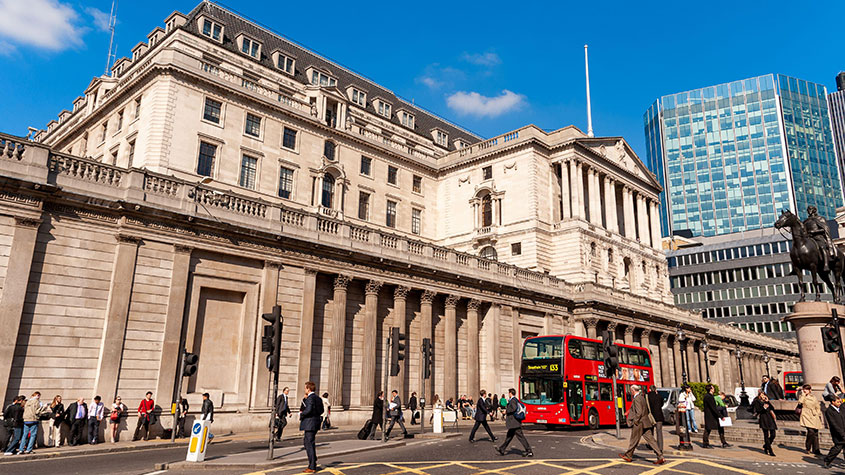Mortgage interest rates are signalling a return to lower inflation
The pricing of fixed-rate mortgage deals shows that markets are still betting on a return to lower inflation and low rates, says Cris Sholto Heaton.


Get the latest financial news, insights and expert analysis from our award-winning MoneyWeek team, to help you understand what really matters when it comes to your finances.
You are now subscribed
Your newsletter sign-up was successful
Want to add more newsletters?

Twice daily
MoneyWeek
Get the latest financial news, insights and expert analysis from our award-winning MoneyWeek team, to help you understand what really matters when it comes to your finances.

Four times a week
Look After My Bills
Sign up to our free money-saving newsletter, filled with the latest news and expert advice to help you find the best tips and deals for managing your bills. Start saving today!
Anybody who has been looking at mortgages recently may have noticed something surprising. If you want a two-year fixed-rate mortgage on a 60% loan-to-value, you could get 3.82% from First Direct, for example. However, if you want a five-year fix, you’d pay 3.58% at the same lender – ie, a lower rate. And if you’re going for a ten-year fix, the offer is 3.83% – only 0.01 percentage point more than the two-year.
I’m using First Direct here because it’s a clean example of the point – the terms across its mortgages are similar and there aren’t huge differences in early redemption charges or other nuances. But the same applies at many other lenders as well.
This is really not what you would expect. The basic principle behind a yield curve is that lenders expect higher rates for lending for a longer period. Occasionally yield curves on government bonds may be very flat or even invert slightly, but such a small difference between the five-year and ten-year rates on mortgages is uncommon. I reckon the gap of about 0.25 percentage points in the example is about one-third of what it’s been over the longer term.
MoneyWeek
Subscribe to MoneyWeek today and get your first six magazine issues absolutely FREE

Sign up to Money Morning
Don't miss the latest investment and personal finances news, market analysis, plus money-saving tips with our free twice-daily newsletter
Don't miss the latest investment and personal finances news, market analysis, plus money-saving tips with our free twice-daily newsletter
Pricing in a return to lower inflation
So what’s going on? You can see the answer pretty clearly if you look at what’s called the overnight index swap (OIS) forward curve, the data for which can be found on the Bank of England website. The OIS forward curve is essentially the forecast for what interest rates will be at a given point in the future. They are not the interest rate for lending for that long – they are simply what the rate is predicted to be at that point, implied from market pricing of interest-rate derivatives.
Thus the Bank of England OIS forward curve now suggests that interest rates will be at around 4.5% in the middle of next year. That’s a sharp rise from what it was implying just a month ago (around 2.5%-3%) and vastly up on expectations of around 1.5% six months ago. But the curve then predicts that rates will drop back sharply and will be around 3% by late 2025. That’s also up on forecasts from a month ago – when rates were expected to be 2% in 2025 – but has gone up by much less than expectations for rates next year.
That’s the explanation for why mortgage rates look so back-to-front: the market expects much lower long-term rates, and so loans for longer periods are pricing that in. This may happen – or it could suggest that markets are being too slow to recognise whether we are moving from a low-inflation/low-rate regime to one where both are at more historically normal levels.
We won’t know for a while, but if markets are wrong, this will have huge consequences for the pricing of all sorts of assets. However, for anybody looking for long-term mortgage security, the gap between five-year and ten-year rates looks notably low – and might not last much longer if expectations change.
Get the latest financial news, insights and expert analysis from our award-winning MoneyWeek team, to help you understand what really matters when it comes to your finances.

Cris Sholt Heaton is the contributing editor for MoneyWeek.
He is an investment analyst and writer who has been contributing to MoneyWeek since 2006 and was managing editor of the magazine between 2016 and 2018. He is experienced in covering international investing, believing many investors still focus too much on their home markets and that it pays to take advantage of all the opportunities the world offers.
He often writes about Asian equities, international income and global asset allocation.
-
 Early signs of the AI apocalypse?
Early signs of the AI apocalypse?Uncertainty is rife as investors question what the impact of AI will be.
-
 Reach for the stars to boost Britain's space industry
Reach for the stars to boost Britain's space industryopinion We can’t afford to neglect Britain's space industry. Unfortunately, the government is taking completely the wrong approach, says Matthew Lynn